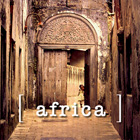
|
|||||||
Photo credit for "Africa" graphic, above: © 2005 Jennifer Lewis
|
AFRICA SUFFERS SPREAD OF FAMINE, HUNGER
1 August 2005 As the world begins to focus on the nearly 3 million facing hunger in Niger and the catastrophic refugee crisis in Darfur, in western Sudan, an estimated 31.1 million people across the continent face food shortages. Even as war, corruption, international debt and AIDS weigh on the populations of the region, desert and famine are spreading beyond the control of local governments. Consequently, arable land, foodstocks and agriculture in general are suffering dangerous setbacks, making it increasingly difficult to feed African populations, some of which are growing rapidly. Some observers blame the international community's hunger-response system, which does not seem to effectively trace statistics or respond to localized crises. The current situation in Niger came to light much to the credit of a BBC team which broadcast images of starving children around the world. A major problem in the response to hunger in Africa has been the tendency not to perceive the nuances and specifics of these remote regional crises. Major news organizations are not in the habit of reporting from these outlying regions, and governments do not tend to view those who suffer as any kind of threat to international peace and security. Twenty years after Live Aid, Ethiopia still faces increasing desertification and spreading drought. In 2001, the UN's Food and Agriculture Organization reported some 200 million people were suffering from malnutrition in sub-Saharan Africa. It is reported that in 1947, upon gaining independence from Great Britain, India had a more complete road network than Africa has now, at the beginning of the 21st century. This means that even when aid is sent and efforts are made to slow the advance of poverty and famine, infrastructure slows the progress of such efforts. The continent is facing new challenges as globalization makes economic competition on world markets increasingly difficult and food is often directed to wealthier or more advanced nations that also suffer shortages of water for irrigation or industry. [For more: CSM] |
||||||
|
|||||||

